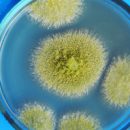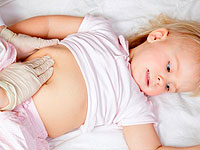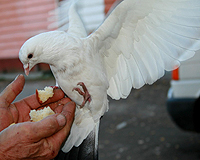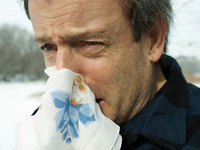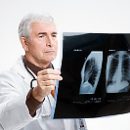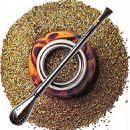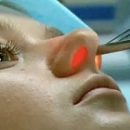What is lemaryiosis? As the disease is manifested? How to examine and treatment during lemiosis? Answers to these questions you will find in the article.
Content
What is lemaryiosis
Listeriosis - infectious disease characterized by preferential
lesion of lymphoid tissue and nervous system, the development of specific formations in organs (mainly,
in the liver).
Liseriosis is characterized by a variety of clinical manifestations, can flow
in two forms: acquired and congenital.
The causative agent of listeriosis - Listeria - is represented by short chopsticks and kokkobacillia.
Bacteria are movable, make characteristic tumblers.
Listeria is resistant in the external environment, with moderate and low temperatures in
Soil persists and even multiplied for months and years. On fodder grain
Save up to three years, exist and multiply in meat and milk
at 4-6 degrees Celsius. At boiling dying for 3-5 minutes; unstable
to the action of disinfectants.
Listeria is common widespread. The main natural tank is various animals and birds; From the body of the patient's animal, the causative agent stands out
with urine, feces, nasal separated, milk, oily liquid.
The main paths of infection with letteriosis - contact through the skin and mucous membranes (care for
animals, cutting carcass), through food, through the air (when working with feeds), vertical
(through the birth paths of the mother)
The most affected by letteriosis contingents: newborn (39-50% of all cases) and faces
elderly.
What are the manifestations of lesteriosis
Acquired Listeriosis. Duration of the incubation period - 2-4 weeks. Main clinical forms: anginal, eye-iron, typhoid, sheets
nervous system. Angic (mononucleositiable) form of lumberiosis has the following manifestations: fever, decrease
Appetitis, headache, general weakness, angina, increase lymphatic
knots. The eye-iron form develops when penetration of licenses through
conjunctiva eye («Surgery of Kupachikovikov») and characterized by fever, decreased appetite, head
pain, total weakness, ethimous and redness of the eyelid, narrowing the eye slit, purulent
separated in the corner of the eye, increase in size and become painful
The lymph nodes.
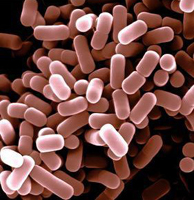 The typhoid form of lisheriosis has such manifestations as: long fever, rash from spotted
The typhoid form of lisheriosis has such manifestations as: long fever, rash from spotted
to bruise, angina and conjunctivitis are missing. Tiffoid ForeMa lottery usually develops in children
with immunodeficiency, and sothe newborn and children of the first year of life. Liseriosis
The nervous system can proceed in the form of meningitis, encephalitis, meningoencephalitis.
Current. After the suffering disease, residual phenomena are possible
In the form of mental disorders, retreat in psychomotor development, paralysis.
The most frequent form of lumberiosis in adults.
Congenital lemaryiosis. Fetal infection can occur as intrauterine, on any gestation period
(but not earlier than the 5th week) and during childbirth. Therefore, the outcomes of infection
May be different: spontaneous abortions, stillbirth, the birth of children
with malformations - with the defeat of the fetus in the first half of pregnancy; or
Birth of a child with congenital lemgery - with later infection.
Congenital Listeriosis is one of the most difficult options for the development of infectious
Diseases, with high risk of fatal outcome. Clinical manifestations of congenital lisheriosis are not specific.
Possible: high fever; Disruption of appetite (rejection of feeding), swelling
or vomiting, lethargy, inhibition, change of pulse, blue, «marble»
Skin, rash nodes (tubercles) rash, spotted or bruising, defeat
Liver (jaundice), meningitis and meningoencephalitis (excitation or depression
Consciousness).
Survey and treatment of lesteriosis
Microscopy and excluding pathogen. Materials for research - Blood, Likvor,
mucus from the oz, the material of increased lymph nodes; in newborns additionally - Mekonia, umbilical blood.
- Bed regime, restriction of physical activity.
- Insulation of the patient.
- Antibiotics of the tetracycline row of 0.2-0.3 g after 6 hours for 7-10
Days. Under meningitis - benzylpenicillin at 75,000-100,000 units / kg in / in every
4 h, the drug is canceled 2 weeks after the normalization of body temperature, Togramycin 2 mg / kg to / every 8 hours, drugs are canceled 4 weeks after
Normalization of body temperature. With eye-glazed lesteriosis - erythromycin
30 mg / kg / day inside in 4 reception, the drug is canceled 1 week after normalization
Temperatures of the body.
- Alternatives: Kotrimoxazole 5 mg / kg Trimethopris in / in every
6 h, Clarithromycin, Ciprofloxacin.

